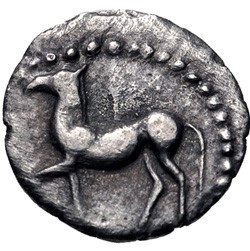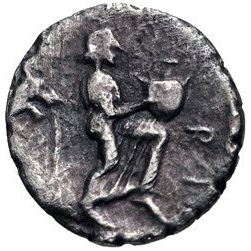Title: Obolos of Larissa - 2018.04
Acquisition number: 2018.04
Author or editor: Peter Londey
Culture or period: Classical Greece.
Date: c. 460 - 400 BC.
Material: Metal - Silver
Object type: Coins - Greek
Dimensions: 10mm (w)
Origin region or location: Greece
Origin city: Larissa.
Display case or on loan: 5
Keywords: Coin, Greek, obolos, Larissa, Thessaly, Peloponnesian War
Classical Numismatic Group, TheBCD Collection of the Coinage of Thessaly (Auction XV [3 January 2012], Lancaster PA and London, Triton, 2012), II 361.3.
O. Hoover, Handbook of Greek Coinage 13 vols (Classical Numismatic Group, Lancaster, PA, 2009-2013), 4, 483.
Classical Numismatic Group Auction, 431 lot 102.
2018.04
Obolos of Larissa
Silver 0.60 g. 10 mm. 460-400 BC.
Obv.: horse trotting, l.
Rev.: the nymph Larissa, balancing a hydria on her knee, with lion’s head water-fountain behind her.
In the 5th century BC, Larissa, with Pharsalos and Pherai, was one of the three main cities of Thessaly in northern Greece. The Thessalian cities were ruled by aristocracies, while farming was mainly carried out by agricultural serfs, the penestai. The Aleuadai, the dominant clan in Larissa, claimed descent from the mythical Aleuas the Red, supposed to have been the first tagos, or supreme magistrate, of Thessaly.
The obverse depicts a horse, a common image on Thessalian coinage. Thessaly was an area of open plains, suited to agriculture and the raising of horses, and as a result was renowned for its cavalry. The Thessalians medized in 480 BC, but around 461 formed an alliance with Athens. In 431, at the start of the Peloponnesian War, six Thessalian cities, including Larissa, sent cavalry contingents to fight for Athens (Thuc. 2.22).
The reverse features a nymph carrying a hydria on her knee. This coin was struck in the fifth century BC and is a good example of classical Greek imagery.
Purchased by the Friends of the ANU Classics Museum in memory of Jill Greenwell.
Classical Numismatic Group, TheBCD Collection of the Coinage of Thessaly (Auction XV [3 January 2012], Lancaster PA and London, Triton, 2012), II 361.3.
O. Hoover, Handbook of Greek Coinage 13 vols (Classical Numismatic Group, Lancaster, PA, 2009-2013), 4, 483.
Classical Numismatic Group Auction, 431 lot 102.

